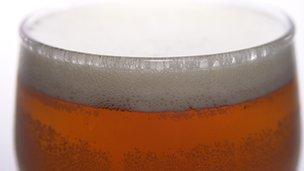Bere conservation aided by drinks industry
- Published

Bere is being used to brew beer in Orkney and whisky in the Hebrides
Efforts to conserve Scotland's oldest cultivated barley have been boosted by its use in making beer and whisky.
Bere is only commercially grown in Orkney, Shetland and the Western Isles after farmers elsewhere switched to more modern varieties.
The Agronomy Institute at Orkney College UHI is trying to prevent the demise of the crop.
Its use by distillers on Arran and Islay in the Inner Hebrides has increased production of bere.
Dr Peter Martin, of the Agronomy Institute, said the barley had fallen out of fashion with most farmers.
He said: "Bere is suited to Scotland's short growing season, which is much shorter than England's.
"But its long straw makes it susceptible to falling over, making harvesting of it difficult. It also has a lower grain yield than most modern varieties."
However, Dr Martin said the barley was part of Scotland's heritage.
Bere is what is known as a landrace, external, a crop with a long history of cultivation and seed production, and has adapted to local environmental conditions.
Dr Martin added that characteristics such as the short time the barley takes to grow and its tolerance to bad weather, made it potentially important for the growing of new varieties.
In Orkney, the area of bere grown has increased from about nine acres (4ha) in 2000 to 61 acres (25ha) this year.
Dr Martin has presented a summary of the conservation work at University of the Highlands and Islands' Mapping the Past and Charting the Future conference in Inverness, which finishes on Friday.